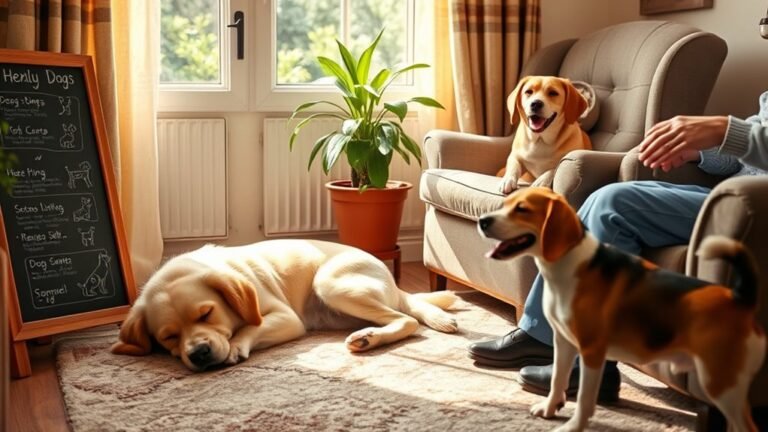Ultimate Guide to Dog Socialization
Dog socialization is very important for all pet owners. It helps your dog feel confident and comfortable in new places and situations. Good socialization also reduces anxiety for your furry friend. The best time to start is between 3 to 14 weeks old.
So, how can you help your dog meet new people and experience different things? Here are some easy tips:
- Take Walks in Different Places: Walk your dog in parks, busy streets, and quiet neighborhoods. This helps them see and hear new things.
- Meet Other Dogs: Arrange playdates with other friendly dogs. This teaches your dog how to interact and have fun with others.
- Visit Pet-Friendly Stores: Take your dog to shops that allow pets. It's a great way for them to meet new people and hear different sounds.
- Attend Training Classes: Join a puppy training class. It helps your dog learn skills while being around other dogs and people.
- Expose Them to Different Situations: Let your dog experience things like car rides, different weather, and various surfaces (like grass, sand, or pavement).
Remember, always be patient and positive with your dog during these experiences. This will help them feel safe and loved. Happy socializing!
Key Takeaways
- Start socializing puppies between 3 and 14 weeks old. This helps them feel confident and grow better.
- Slowly introduce your dog to different people, pets, and places. Make sure these experiences are positive.
- Take short trips to new locations. Give your dog treats and praise when they are calm.
- Pay close attention to how dogs act with each other. If you see signs of stress or aggression, separate them right away.
- If your dog shows fear, help them get used to what scares them by using positive reinforcement. If needed, ask a professional for help.
Understanding Dog Socialization: Why It Matters
Understanding how to socialize your dog is very important for having a happy and well-behaved pet. Puppies learn best between three and fourteen weeks old. During this time, they're open to new experiences. It's a great chance to introduce your puppy to different people, places, and sounds.
Socializing your pup has many benefits. Dogs that meet various people and other animals become more confident and less anxious. They're usually friendlier and act better around others. This helps prevent aggression or fear later on. By spending time on socialization, you help your dog grow up to be a flexible and friendly companion.
Also, good socialization makes your bond with your dog stronger. A well-socialized pet isn't just a good pet; it's also a joy to be around.
The Best Age to Start Socializing Your Dog
Socializing your dog is important, and it's best to start early. The best time to socialize most dogs is when they're between 3 and 14 weeks old.
During this time, puppies are open to new experiences and making friends. Here's how you can help your puppy learn and grow during this key time:
- Introduce your puppy to different people, animals, and places. This helps them feel confident.
- Let them hear various sounds, see new sights, and smell different things. This reduces any fear as they grow.
- Join puppy classes. These classes provide a safe space for puppies to meet others and learn in a fun way.
Starting socialization early can help your dog become friendly and well-adjusted. Enjoy the journey of raising your puppy!
Tips for Introducing Your Dog to New Environments
Introducing your dog to new places can be fun and exciting! It's important to do this with patience and a happy attitude. Start by taking your dog on short trips to help them feel comfortable. Visit different places like parks, markets, or busy streets. Each spot has new sounds, smells, and sights for your dog to explore.
Pay attention to how your dog reacts in these new settings. This will help you know what they like or don't like. Encourage them to check things out and give them treats or praise when they stay calm. This will help them feel more secure in new environments.
Make sure to let your dog experience different sounds and smells. This can help them feel more confident in new places. Always check that your dog is enjoying these adventures.
A happy experience will help both you and your dog feel more at home in these new places. Enjoy the journey together!
Meeting Other Dogs: Best Practices
When you bring your dog to new places, it's important to help them meet other dogs in a friendly way. Here are some easy tips to make those meetings fun and safe for everyone.
- Go Slow: Introduce your dog to new dog friends one at a time. This way, they won't feel scared or overloaded.
- Watch Closely: Keep an eye on how both dogs act. Signs of stress might include stiff bodies or fur standing up. If you see these signs, it may be best to separate the dogs.
- Give Treats: When your dog plays nicely, give them treats and praise. This helps them learn that good behavior leads to rewards, making them feel safe and happy.
Following these tips can help your dog enjoy meeting new furry pals!
Socializing With People: Building Confidence
Building confidence in your dog when meeting people takes time and care. Start by introducing your dog to friendly people in calm places. Let your dog meet different kinds of people, like kids and adults, and those who look different. Use treats or toys to help your dog feel happy and relaxed around them.
Play fun social games with your dog. These games can help your dog feel less anxious and want to interact more. Always watch how your dog feels. If your dog seems scared or stressed, take a break and try again later.
Making new friends helps your dog trust people and feel comfortable. A dog that enjoys being around people can have fun experiences and feel part of your family.
This builds a stronger bond between you and your dog. So, keep practicing, and soon your dog will be more confident with new friends!
Addressing Fearful or Aggressive Behaviors
Fearful or aggressive behaviors in dogs can come from anxiety or bad past experiences. Understanding why your dog feels this way is very important to help them. The fear response can show in different ways.
Here are some simple ways to manage aggression:
- Desensitization: Slowly introduce your dog to things that scare them in a safe space. This helps them get used to the trigger and feel less afraid over time.
- Positive Reinforcement: When your dog stays calm, give them treats or praise. This teaches them that being calm in tough situations is good.
- Professional Help: If your dog continues to be aggressive, talk to a dog trainer or animal behaviorist. They can help you learn how to keep your dog and others safe.
Ongoing Socialization: Maintaining Skills Throughout Life
Socializing your dog is super important, not just when they're puppies, but for their whole life. Keeping your dog around different people, places, and other animals helps them stay happy and confident. Regular exposure helps them remember what they've learned and can stop bad behaviors from coming back.
As a dog owner, you can help by making sure your dog gets to experience new things often. Going to parks, attending dog-friendly events, and joining training classes can be fun ways to help your dog stay social.
This not only helps your dog learn but also brings the two of you closer together.
A well-socialized dog adjusts easily to new situations and makes your life better. It can also help create a friendly and welcoming community where everyone enjoys being around dogs.
Fun Activities to Enhance Socialization Skills
To help your dog get better at socializing, try fun activities!
These activities can build your dog's confidence and help them interact well with other dogs and people.
Here are three enjoyable ways to improve your dog's social skills:
- Playful games: Play games like fetch or tug-of-war. These games help your dog learn how to communicate and interact, making social time more relaxed.
- Group walks: Take your dog for walks with other dogs. This lets them see new places and meet new friends, encouraging good behavior.
- Dog parks: Visit local dog parks. Here, your dog can play with other dogs in a safe space, helping them make friends and have fun.
Including these activities in your daily routine will help your dog's social skills and make them happier overall!
Frequently Asked Questions
Can Socialization Help With Separation Anxiety in Dogs?
Yes, socializing your dog can help with separation anxiety. When you take your dog to new places and meet new people, it helps them feel more confident. A confident dog is less likely to get upset when you leave them alone. By exposing your dog to different environments and experiences, you teach them that being alone isn't scary. This can make a big difference in how they handle being on their own.
How Do I Know if My Dog Is Struggling Socially?
You can tell if your dog is having a hard time socializing by watching how they act. Look for signs like barking too much, hiding away, or acting aggressive. These behaviors usually mean your dog feels nervous or uncomfortable around other dogs or people. Pay attention to what your dog is saying with their body language. Being aware of these signs can help you understand your dog's feelings better.
What Should I Do if My Dog Becomes Overwhelmed?
If your dog feels overwhelmed, pay close attention to how they act. Use simple calming techniques, like petting them gently or moving them to a quiet room. Make sure their space feels safe and cozy, so they know they belong and can relax.
Are There Specific Breeds That Need More Socialization?
Some dog breeds need more socialization than others. For example, herding and working dogs often need special socialization to help them feel confident. Other breeds might adjust more easily without extra help. It's best to tailor your methods to fit each dog for better results.
How Can Socialization Impact My Dog's Behavior at Home?
Socialization can really change how your dog acts at home. When you help your dog meet new people and other animals, it can make a big difference. This training can help your dog feel less scared and stop bad behaviors like barking or acting rough.
A well-socialized dog knows how to behave in different places and with different friends. This makes it easier for your dog to relax at home and enjoy being with you. In turn, your time together becomes much happier!







